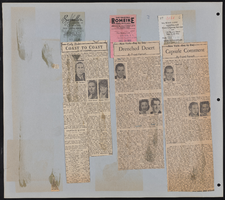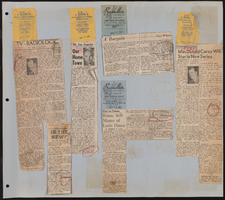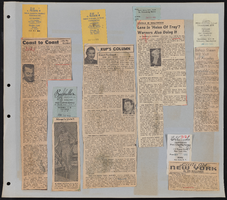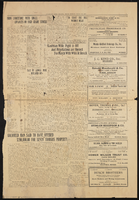Search the Special Collections and Archives Portal
Search Results

Transcript of interview with Michael J. Signorelli by Claytee D. White, Stefani Evans, August 4, 2016
Date
Archival Collection
Description
Michael Signorelli, long-time Las Vegas resident and builder of many local homes, apartments and hotels, describes his upbringing, career, and stellar reputation as part of the “Building Las Vegas” oral history project. Raised in Rhode Island, the only child of an Italian-American father and a Southern Baptist mother, Michael’s early life was influenced by his father’s disability as a World War Two veteran and his non-English speaking paternal grandparents, who owned and ran a grocery store. Talking of his experiences in helping them run the grocery store he says, "I became a businessman at the age of twelve." His military service during the Vietnam War landed him at Nellis Air Force Base in Las Vegas. Once here, Michael furthered his education at UNLV, obtaining both his MEd and PhD degrees. In Las Vegas Michael began his work in the housing arena working for Sun Home Builders and his non-profit work, helping to raise funds for the newly formed Rape Crisis Center. Signorelli went on to work for Howard Hughes's Summa Corporation, where he successfully fought against a discrimination lawsuit brought by twenty-one female dealers. In 1978 Michael started his own company, Nicro Corporation, and began building homes in the Las Vegas valley with land he acquired on a hand-shake and a verbal contract. He continued his non-profit work, which included coordinating Lady Bird Johnson’s Green Thumb project for Nevada and the Pacific Northwest. In the 1980s Signorelli was recruited by the Fitzgerald Group, where he was involved in non-gaming operations for their many hotels, cattle ranch, and an in vitro clinic. In this interview, Signorelli describes his non-Las Vegas building projects in Mesquite and Laughlin. He built the Mesquite Star hotel and casino by overcoming multiple hurdles around water access and money. Despite twice obtaining a loan for one hundred million dollars, he was never able to successfully complete the Laughlin hotel and casino, due to legal issues from his partner’s family trust. Signorelli also shares his idea for a unique hotel and casino called the Nev Star that involved his successful negotiation of a waiver to Senate Bill 208. Signorelli concludes his interview by talking about his ownership of the world-famous Golden Steer Steak House restaurant, which opened in 1958. Under Signorelli’s ownership the Golden Steer has been featured in national publications and claims many legendary fans such as NACAR driver Mario Andretti, who in 2016 celebrated his seventy-six birthday at the Golden Steer. Signorelli’s love of Las Vegas and its many positive traits come forth as he talks about his daughter and her achievements and suggests Vegas promoters should do a better job about what great schools, medical care, and government we have in Las Vegas.
Text

Transcript of interview with Randy Lavigne by Stefani Evans and Clatyee D. White, August 23, 2016
Date
Archival Collection
Description
Randy Lavigne, Honorary AIA, has every reason to smile. Since 1995 she has been the Executive Director for AIA (American Institute of Architects) Las Vegas professional organization; she works daily with her daughter in a beautifully restored historic building in the heart of downtown Las Vegas; and the architects with whom she works so value her contributions they compiled and submitted documentation in order to surprise her with honorary AIA membership. In this interview, Lavigne recalls growing up in segregated Emory Gap, Tennessee, where her grandfather bought all the schoolchildren new shoes every year. She details the cross-country trip that brought her to Las Vegas in 1994 and eventually to the AIA in 1995. The bulk of the interview focuses on the building where the AIA is housed and the history of the organization. In 2008 the AIA moved from its former home at UNLV’s School of Architecture to the historic Fifth Street School in downtown Las Vegas. Lavigne discusses the history of the building and its significance to the City of Las Vegas. She reveals plans to examine the architectural history Las Vegas to celebrate the AIA Chapter’s sixtieth anniversary. She also talks about diversity in the profession, the process of licensure, publications, continuing education, organizational records, and the now-defunct auxiliary organization, the Architects' Wives League.
Text

Patricia Vazquez interview, November 14, 2018, June 14, 2019: transcript
Date
Archival Collection
Description
Session 1: Interviewed by Marcela Rodriguez-Campo. Barbara Tabach also participates in the questioning. Session 2: Interviewed by Rodrigo Vazquez. Monserrath Hernandez also participates in the questioning. Patricia Vazquez was born and raised in Las Vegas, NV and shares her experiences growing up in the Valley as a Queer Latina. At a young age, she remembers traveling back and forth between Mexico and the U.S. to visit family. When she started school she shares how her home language, Spanish, became her family's "secret language" as she began to learn English. During elementary school Patricia was tracked into the special education program, and remove from the mainstream classroom. She would find her love for learning in books and libraries as she taught herself how to read in English. Despite being tracked into less advanced courses, Patricia would end up taking AP/ Honors courses in high school after forging her favorite teachers signature, which changed her educational trajectory. After coming out to her family, Patricia went nearly a decade distanced from her mother and continued her college education at Arizona State University. There, she would complete a bachelors in painting and a masters in comparative literature. Her work with the Chicano Studies program at ASU helped her develop her Chicana identity and begin her involvement in social activism. In Las Vegas, she worked to fight for marriage equality and LGBTQ rights with the American Civil Liberties Union , and later with the Progressive Leadership Alliance of Nevada. She also conducted several lectures for the Latino Youth Leadership Conference on sexuality, gender, and homophobia for over a decade. She has served as an English Professor at the College of Southern Nevada for the last 20 years and is an avid hiker, traveler, and painter.
Text

Transcript of interview with Virginia Beckly Richardson by Claytee D. White and Carole C. Terry, November 5, 2009
Date
Archival Collection
Description
Through her oral interview and the materials she provided, Virginia Beckley Richardson gives us a unique and fascinating look at both a pioneer family of Las Vegas and the early activities of the Service League, the forerunner of the Junior League of Las Vegas. Her personal recollections are an insight into life in the city's early years, and the biography of her father written by her brother, Bruce, humanizes a prominent figure in Las Vegas' history. The newspaper articles she made available enhance her descriptions of the Service League's activities. In addition, the article, "Merchant's Home Becomes Monument," describes her family home originally located on Fourth Street and relocated by the Junior League of Las Vegas in 1979. Her recollections clearly demonstrate her enthusiasm about her family's accomplishments and her involvement in the Service League
Text

Transcript of interview with Helen Early by Dale Forshee, February 26 & 27, 1979
Date
Archival Collection
Description
On February 26 and 27, 1979, Dale Forshee interviewed Helen Early (born 1919 in Des Moines, Iowa) about her life in Southern Nevada. Early first talks about her arrival to Las Vegas and the early development of the city. She also talks about some of the first businesses in Las Vegas, the initial development of the University of Nevada, Las Vegas, and the early nightclubs and casinos in the city. Early also discusses her work in establishing a school for disabled children before discussing other topics related to McCarran Airport, Bugsy Siegel, Senator Walter Baring, the first churches in Las Vegas, and the Helldorado Parade.
Text





